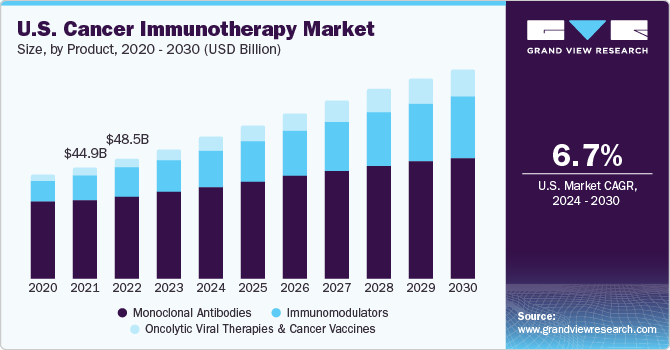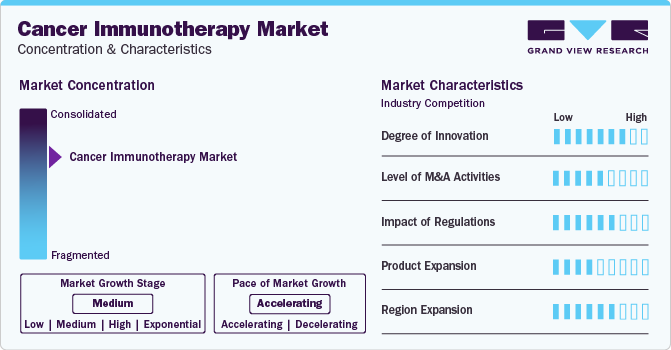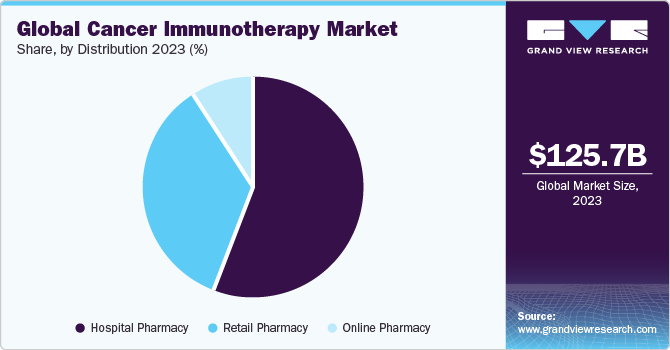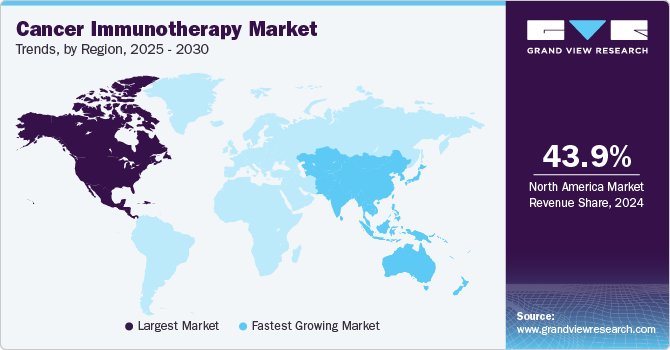- Home
- »
- Pharmaceuticals
- »
-
Cancer Immunotherapy Market Size & Share Report, 2030GVR Report cover
![Cancer Immunotherapy Market Size, Share & Trends Report]()
Cancer Immunotherapy Market Size, Share & Trends Analysis Report, By Product, By Application, By Distribution (Hospital Pharmacy, Retail Pharmacy, Online Pharmacy), By End Use, By Region, And Segment Forecasts, 2024 - 2030
- Report ID: GVR-1-68038-693-6
- Number of Pages: 110
- Format: Electronic (PDF)
- Historical Range: 2018 - 2022
- Industry: Healthcare
Cancer Immunotherapy Market Trends
The global cancer immunotherapy market size was estimated at USD 125.69 billion in 2023 and is projected to grow at a compound annual growth rate (CAGR) of 8.3% from 2024 to 2030. Increasing prevalence of cancer is a major factor contributing to the market growth. According to the American Cancer Society journal, in the U.S. about 1,958,310 new cancer cases and 609,820 cancer deaths are estimated to occur in the year 2023. Growing R&D activities by pharmaceutical companies, and technological advancements and introduction of novel drugs are factors expected to drive cancer immunotherapy market growth in the forecast period.

Increasing prevalence of cancer is boosting the demand for this market. According to the International Agency for Research on Cancer (IARC) estimates, in the year 2020, there were about 19.29 million cancer cases which is estimated to increase to 24.58 million cases by 2030. This significant increase in the disease burden on the population is expected to drive the global market during the forecast period.
Rising approval of novel immunotherapies is expected to propel the market growth over the forecast period. According to the American Association for Cancer Research article in July 2023, FDA approved the quizartinib (Vanflyta) for treating different phases of newly diagnosed acute myeloid leukemia (AML). Quizartinib focuses on FLT3, a kinase that goes twisted in about one-third of AML cases. The usual glitch in (FMS like tyrosine kinase 3) FLT3 is an internal tandem duplication, where parts of the FLT3 gene get copied multiple times in a row.AML treatment generally follows a three-step process: induction, consolidation, and maintenance. During induction, powerful chemotherapy is administered to eliminate the majority of leukemia cells. The next phase, consolidation, involves further chemotherapy to eradicate any remaining cancer cells. Finally, maintenance treatment aims to prevent a recurrence of the disease.
For individuals with FLT3 internal tandem duplication, the treatment approach has evolved. Quizartinib can now be integrated into both induction and consolidation regimens, offering an enhanced therapeutic strategy. Moreover, it is employed as a standalone therapy for maintenance, contributing to a more targeted and comprehensive treatment plan for AML patients with this specific genetic mutation.
Various Strategic initiatives undertaken by major players are also anticipated to facilitate the market demand. For instance, in September 2023, Immatics and Moderna strategically collaborated to develop the Oncology Therapeutics. The collaboration includes an assessment of Immatics investigational PRAME203 TCRT in combination with the MARTE mRNA cancer vaccine being developed by Moderna. Moreover, in August 2023, FBD Biologics Limited and Shanghai Henlius Biotech, Inc. entered into strategic collaboration to boost the development of new immunotherapies. These aspects are boosting the market.
Market Concentration & Characteristics
The global market has experienced a significant degree of innovation, advancements include targeted therapies, and precision medicine, tailoring treatments to individual genetic profiles. Targeted therapies focus on specific molecules involved in cancer growth, minimizing damage to healthy cells. Precision medicine analyzes genetic alterations, allowing personalized treatment strategies for better efficacy. Additionally, advancements in CAR-T cell therapy showcase the potential of genetically engineered immune cells to specifically target cancer cells.
Several market players, such as Pfizer Inc., AstraZeneca, Merck & Co., Inc, and F. Hoffmann-La Roche Ltd, are involved in merger and acquisition activities. Through M&A activity, these companies expand their geographic reach and enter new territories.

Companies are actively investing substantial resources in clinical trials and regulatory submissions to obtain regulatory approval for pipeline products. This results in increasing the cost of developing novel cancer immunotherapy technologies.
Cancer immunotherapy leverages the body's immune system to fight against cancer. This approach of cancer therapy has witnessed notable product expansion in the recent years. Checkpoint inhibitors like Keytruda and Opdivo lead the way, blocking signals cancer cells use to evade immune detection. CAR-T cell therapies, such as Kymriah and Yescarta, involve modifying a patient's immune cells to target and destroy cancer. Bispecific antibodies, exemplified by Blinatumomab, enhance immune response by connecting immune cells to cancer cells. These innovative products mark a transformative shift in cancer treatment, offering more options and improved patient outcomes.
Distribution Insights
Hospital Pharmacy segment dominated the market in 2023. The rising demand for immunotherapies in hospitals and the increasing number of hospitalizations due to an increase in cancer diseases drive hospital pharmacy growth. The difficulty of the treatment and patients affected aged over 65 years increased the hospitalization rate of cancer patients. This has resulted in a high share of the segment. As a result, the segment's share in this market is large.

Online pharmacy segment is estimated to register a significant CAGR over the forecast period,the growing demand of the internet pharmacy segment is a chief factor, e.g. a surge in internet penetration, an increasing adoption of telemedicine, greater use of technology and convenience & time efficiency. Moreover, in the forecast period, the presence of prominent e-pharmacy players and their discounts also help to increase demand for the segment. These aspects are boosting the market.
Regional Insights
North America dominated the market and accounted for 44.4% share in 2023, driven by rising patient awareness, high disease burden, proactive government measures, technological advancements, and improvements in healthcare infrastructure. The presence of key players in this region is a key propeller of market growth. According to Elsevier Ltd. article published in April 2023, The US National Cancer Institute has published its expected national cancer plan, a roadmap, and call to action on improving all stages of care for those suffering from cancer, including prevention, detection, diagnosis during the course of treatment and recovery.

Asia Pacific is anticipated to witness the fastest CAGR in the global market. One of the primary factors driving this growth is an increase in the elderly population, a high number of patients with targeted diseases and improved healthcare infrastructure. Furthermore, the expansion of this region is being aided by an increasing legal acceptance of immunotherapeutics in these regions. According to the MJH Life Sciences article published in November 2023, durvalumab (Imfinzi) plus gemcitabine and cisplatin for frontline use in adult patients with locally advanced or metastatic biliary tract cancer is approved by China’s National Medical Products Administration.
Product Insights
Monoclonal Antibodies segment led the market and accounted for the largest revenue share of 66.8% in 2023, Increasing investment for R&D of monoclonal antibodies—such as bispecific antibodies, conjugated monoclonal antibodies, and naked antigen binding antibodies—has opened new avenues for the growth of companies in the oncology therapeutics space. New-age monoclonal antibodies are designed to impart or possess adaptive immunity, antibody dependent cellular toxicity, and antigen specificity. Monoclonal antibodies are being largely studied for their therapeutic effects against various types of cancers. For instance, in August 2023, FDA has approved Talvey to treat adult patients with relapsed or refractory multiple myeloma who have received at least four prior lines of treatment, including proteasome inhibitors, immunomodulatory agents and an antiCD38 monoclonal antibody.
Oncolytic Viral Therapies and Cancer Vaccines is anticipated to witness a significant market growth over the forecast period. The development of cancer vaccines, which are subject to significant obstacles such as lack of immunogenicity and immunosuppression effects within the tumor microenvironment, must succeed. According to American Association for Cancer Research in June 2023, the US Food and Drug Administration has only approved a limited number of therapeutic vaccines. Some of the choices available include sipuleucel-T (Provenge), which is a vaccine made from cells and is authorized as a treatment for unconventional prostate cancer, laherparepvec talimogene (Imlygic or T-VEC), which is a vaccine derived from a virus and is approved for Bacillus Calmette Guerin and treating metastatic melanoma, a weakened strain of bacteria used to prevent the recurrence of early-stage bladder cancer following surgery. These aspects are boosting the market.
Application Insights
Lung Cancer segment accounted for the largest revenue share in 2023, the increasing prevalence of lung malignancies, growing awareness programs, increasing adoption of immunotherapy, and presence of a robust pipeline of investigational candidates are some of the key factors expected to drive the segment's growth. Furthermore, rising product approval and product launches are fueling the demand forward.For instance, in November 2023, the US Food and Drug Administration (FDA) granted marketing authorizations to Augtyro (Bristol, Inc.) for the treatment of locally refractory or metastatic Non-Small Cell Lung Cancer (NSCLC) with Repotrectinib.
Breast Cancer segment is estimated to register a significant CAGR over the forecast period. The high prevalence of the disease, ongoing research and development activities, and growing investments by leading players to develop novel therapeutics for breast malignancies are expected to accelerate segment expansion. For instance, in November 2023, AstraZeneca got FDA approval for their breast cancer drug capivasertib with fulvestrant.
End Use Insights
Hospitals & Clinics segment accounted for the largest revenue share in 2023. In addition to rising incidence of diseases, increased treatment rate, higher awareness and malignancy diagnosis as well as a large number of hospitals offering immunotherapies is contributing to an increase in the number of patients treated. To treat cancer, hospitals are adopting immunotherapies. According to the National Cancer Institute article published in April 2023, in the U.S. 25% of patients died in a hospital, with 62% hospitalized at least once in the last month of life for the cancer treatments.
Cancer Research Centers segment is estimated to register a significant CAGR over the forecast period. Increased research on cancer and ongoing supportive activities carried out by government or national organizations in the form of grant funding have contributed to segment growth with a view to stimulating demand. According to Becker's Healthcare article published in November 2023, to expand research into cancer, Texas Oncology has recently revealed its Amarillo Comprehensive Cancer Center, a state-of-the-art facility representing a significant investment of USD 150 million. This cutting-edge center is poised to enhance cancer care, providing advanced and comprehensive services in the Amarillo region. These aspects are boosting the market.
Key Companies & Market Share Insights
-
Pfizer Inc., AstraZeneca, and Merck & Co., Inc. are some of the dominant players operating in the global market.
-
Pfizer, Inc. is engaged in discovery, development, manufacture, sales, and distribution of medical products across the world. Pfizer’s products range includes medicines, vaccines, and consumer goods
-
Merck & Co., Inc. is a healthcare solutions provider that operates majorly operates in four segments: pharmaceutical, healthcare services, animal health, and alliances. It offers therapeutic products for asthma, hepatitis C, diabetes, cardiovascular diseases, HIV infections, fungal & intra-abdominal infections, osteoporosis, hypertension, and fertility issues
-
Bristol-Myers Squibb Company, Novartis AG, and Immunocore, Ltd are some of the emerging market players functioning in the market.
-
Novartis AG is a Swiss-based multinational company catering to pharmaceutical market. It is also involved in the R&D, manufacturing, and marketing of healthcare products
-
Bristol-Myers Squibb (BMS) is a pharmaceutical company that manufactures and sells biopharmaceutical products across the globe. It manufactures products in several therapeutic areas, such as psychiatric disorders, cardiovascular disease, diabetes, HIV/AIDS, hepatitis, cancer, and rheumatoid arthritis and is headquartered in New York
Key Cancer Immunotherapy Companies:
- Pfizer Inc.
- AstraZeneca
- Merck & Co., Inc
- F. Hoffmann-La Roche Ltd
- Bristol-Myers Squibb Company
- Novartis AG
- Lilly
- Johnson & Johnson Services, Inc
- Immunocore, Ltd
Recent Developments
-
In October 2023, Pfizer launched the MEKTOVI (binimetinib) + BRAFTOVI (encorafenib) for the treatment of adult patients with metastatic non-small cell lung cancer (NSCLC) with a BRAF V600E mutation, as detected by an FDA-approved test has received approval from U.S. Food and Drug Administration (FDA)
-
In October 2023, Merck's anti-PD-1 therapy KEYTRUDA was approved by the U.S. Food and Drug Administration (FDA) for the treatment of patients with resectable non-small cell lung cancer (NSCLC) as neoadjuvant treatment and adjuvant treatment following surgery
-
In December 2023, the xU.S. FDA approved the FRUZAQLA (fruquintinib) for Previously Treated Metastatic Colorectal Cancer by Takeda
Cancer Immunotherapy Market Report Scope
Report Attribute
Details
Market size value in 2024
USD 138.87 billion
Revenue forecast in 2030
USD 224.30 billion
Growth rate
CAGR of 8.3% from 2024 to 2030
Base year for estimation
2023
Historical data
2018 - 2022
Forecast period
2024 - 2030
Report updated
December 2023
Quantitative units
Revenue in USD million/billion and CAGR from 2024 to 2030
Report coverage
Revenue forecast, company ranking, competitive landscape, growth factors, and trends
Segments covered
Product, application, distribution, end-use, region
Regional scope
North America; Europe; Asia Pacific; Latin America; MEA
Country scope
U.S.; Canada; UK; Germany; France; Italy; Spain; Denmark; Sweden; Norway; Japan; China; India; Australia; Thailand; South Korea; Brazil; Mexico; Argentina; South Africa; Saudi Arabia; UAE; Kuwait.
Key companies profiled
Pfizer Inc.; AstraZeneca; Merck & Co. Inc; F. Hoffmann-La Roche Ltd; Bristol-Myers Squibb Company; Novartis AG; Lilly; Johnson & Johnson Services, Inc; Immunocore, Ltd.
Customization scope
Free report customization (equivalent up to 8 analyst’s working days) with purchase. Addition or alteration to country, regional & segment scope.
Pricing and purchase options
Avail customized purchase options to meet your exact research needs. Explore purchase options
Global Cancer Immunotherapy Market Report Segmentation
This report forecasts revenue growth at global, regional & country levels and provides an analysis of the industry trends in each of the sub-segments from 2018 to 2030. For this study, Grand View Research has segmented the global cancer immunotherapy market report based on product, application, distribution, end use, and region:
-
Product Outlook (Revenue, USD Million, 2018 - 2030)
-
Monoclonal Antibodies
-
Immunomodulators
-
Oncolytic Viral Therapies & Cancer Vaccines
-
-
Application Outlook (Revenue, USD Million, 2018 - 2030)
-
Lung Cancer
-
Breast Cancer
-
Colorectal Cancer
-
Melanoma
-
Prostate Cancer
-
Head & Neck Cancer
-
Ovarian Cancer
-
Pancreatic Cancer
-
Others
-
-
Distribution Channel Outlook (Revenue, USD Million, 2018 - 2030)
-
Hospital Pharmacy
-
Retail Pharmacy
-
Online Pharmacy
-
-
End Use Outlook (Revenue, USD Million, 2018 - 2030)
-
Hospitals & Clinics
-
Cancer Research Centers
-
Others
-
-
Regional Outlook (Revenue, USD Million, 2018 - 2030)
-
North America
-
U.S.
-
Canada
-
-
Europe
-
UK
-
Germany
-
France
-
Italy
-
Spain
-
Denmark
-
Sweden
-
Norway
-
-
Asia Pacific
-
China
-
Japan
-
India
-
Australia
-
Thailand
-
South Korea
-
-
Latin America
-
Brazil
-
Mexico
-
Argentina
-
-
Middle East & Africa
-
South Africa
-
Saudi Arabia
-
UAE
-
Kuwait
-
-
Frequently Asked Questions About This Report
b. Some of the key players in cancer immunotherapy market are Pfizer Inc.; AstraZeneca; Merck & Co., Inc; F. Hoffmann-La Roche Ltd; Bristol-Myers Squibb Company; F. Hoffmann La-Roche Ltd.; Novartis AG; Lilly; Johnson & Johnson Services, Inc; and Immunocore, Ltd, among others.
b. The increasing prevalence of cancer, surge in R&D activities for the development of targeted diseases, and increasing approval of novel immunotherapies for cancer treatment are the major factors driving the cancer immunotherapy market growth over the forecast period.
b. The global cancer immunotherapy market is expected to witness a compound annual growth rate of 8.32% from 2024 to 2030 to reach USD 224.30 billion by 2030.
b. The global cancer immunotherapy market size was valued at USD 125.69 billion in 2023 and is anticipated to reach USD 138.87 billion in 2024.
b. Based on product, the monoclonal antibodies segment accounted for a share of 66.8% in 2023 due to the higher number of approved products and high prescription rate of monoclonal antibodies.
b. North America held the largest share of 44.4% in 2022 and is expected to register a lucrative growth rate over the forecast period. It is attributable to the presence of major market players in the region, increasing introduction of novel immunotherapies, and presence of government and non-government bodies to promote research activities for cancer immunotherapy.
Share this report with your colleague or friend.
![gvr icn]()
NEED A CUSTOM REPORT?
We can customize every report - free of charge - including purchasing stand-alone sections or country-level reports, as well as offer affordable discounts for start-ups & universities. Contact us now
![Certified Icon]()
We are GDPR and CCPA compliant! Your transaction & personal information is safe and secure. For more details, please read our privacy policy.
We are committed towards customer satisfaction, and quality service.
"The quality of research they have done for us has been excellent."





